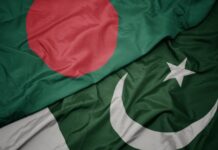This May marks the 20th anniversary of the tragic terror attack in Karachi that left several French engineers dead in a bombing believed to be planned by Pakistani intelligence operatives.
Now called the Karachi Affair – on 8th May 2002, a suicide bomber exploded his vehicle near a bus outside a well-known Karachi hotel, killing 14 people traveling, among them 11 French naval engineers, who were working on a submarine project for the Pakistani navy.
Pakistani authorities blamed Islamist militants, but there were suspicions that the bombing was an act of revenge after then-French President Jacques Chirac ordered the payments of secret arms deal commissions to stop.
FRANCE CONVICTS EX-MINISTER FOR INVOLVEMENT IN KICKBACKS TO PAKISTAN
A French court last year handed a suspended jail term to Francois Leotard (former defence minister of Edouard Balladur’s government which was in power during the nineties) for his hand in allowing corruption in these said arms deals.
Several other French government officials at that time were also found involved in approving payment of the commissions to intermediaries in the sale of three submarines to Pakistan.
These facts came to light while French prosecutors were investigating the Karachi affair and they found members of the French ruling class involved, with investigators looking into allegations that kickbacks from the arms sales to Pakistan helped fund the failed 1995 presidential primary campaign of Edouard Balladur.
DANIEL PEARL MURDER AND THE KARACHI AFFAIR – THE REVENGE ATTACKS
There are also reports that the murder of American journalist, Daniel Pearl, just three months before the bus bombing, was also carried out in connivance with Pakistani state operatives. Pearl was kidnapped on a reporting mission in Karachi and the involvement of state operatives became obvious when one of the demands made by his kidnappers after his abduction also pointed to a possible ulterior motive.
In two emails sent just after his kidnapping, his captors listed a number of conditions for the release of their hostage, one of which was for the United States to deliver the F-16 fighter jets that Pakistan had paid for but never received due to a diplomatic wrangle.
This has led to further belief among the French investigators that the bus bombing was also a revenge attack.
PAK-FRENCH WORSENING TIES SINCE THE KARACHI AFFAIR
Today, two decades later, the French state continues to hold those involved accountable in the Karachi affair, with jailing six other officials but the Pakistani state operatives have evaded justice. Not only that, Pakistan has pursued an anti France agenda in recent years, perhaps in response to the allegations it has faced over the killings of French nationals.
An Islamist violent extremist group Tehreek e Labbaik Pakistan (TLP) known have close ties to the Pakistani army has organized several anti France protests in recent years in the country and its leaders have called for attacking the French embassy in Islamabad on more than one occasion. The reason – the group says the newly re-elected French President Emmanuel Macron has blasphemed by supporting anti Islam cartoons.
Such anti France Islamist radicalization has not led to violence in Pakistan but also in France.
PAKISTANI ATTACKS ON FRENCH SOIL
In the last few years, Pakistani radicals in France have carried out attacks against people for committing so-called blasphemy.
In 2018, an Irish university lecturer was stabbed to death by one of his former students for allegedly ‘insulting the Prophet Mohammed’. The 66-year-old academic, named locally as John Dowling, was attacked and stabbed 13 times outside the Paris university where he worked. Police said Ali R., a 37-year-old Pakistani national was involved and had been arrested. After the killing, Ali told police that the teacher had made fun of his Muslim religion during English classes at the university.
Then in 2020, Zaheer Hassan Mahmood, a Pakistani man living illegally in Paris was caught after he stabbed and injured two people outside the former offices of the Charlie Hebdo magazine. Police say he was radicalised by videos of preachers in Pakistan and anti-France demonstrations back in his country.
The 26-year-old had spent the days leading up to his knife attack watching extremist preachers on YouTube and TikTok denouncing France and Charlie Hebdo.
Reportedly, Mahmood watched videos by protest leader Khadim Hussain Rizvi, the late founder of TLP party, and other radical preachers. He was also influenced by former Prime Minister Imran Khan, who in speeches when in power had accused Macron of “attacking Islam”.
Owing to the so called blasphemous cartoon controversy, Pakistan is yet to post its regular ambassador to France. Although with a new government in power in Islamabad, there have been efforts to reset the ties, but without much progress, given Pakistan’s known duplicity in the past and lack of accountability, even today.
